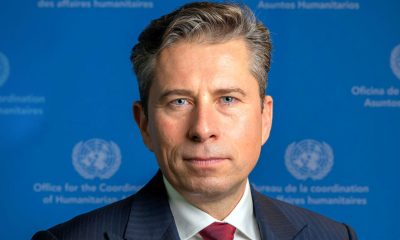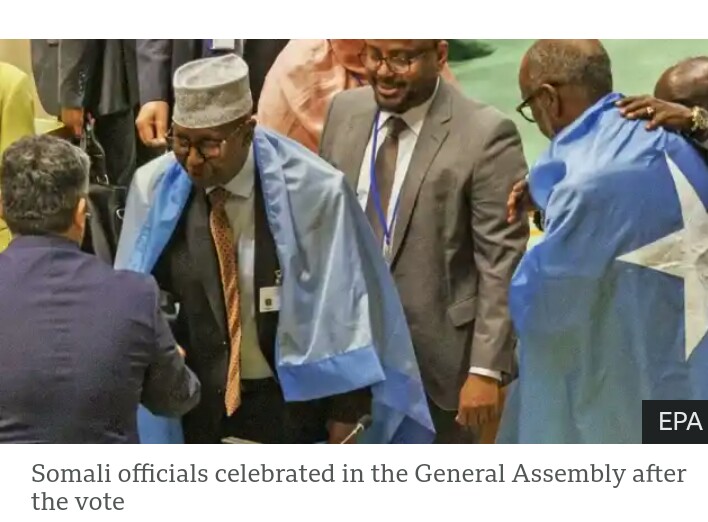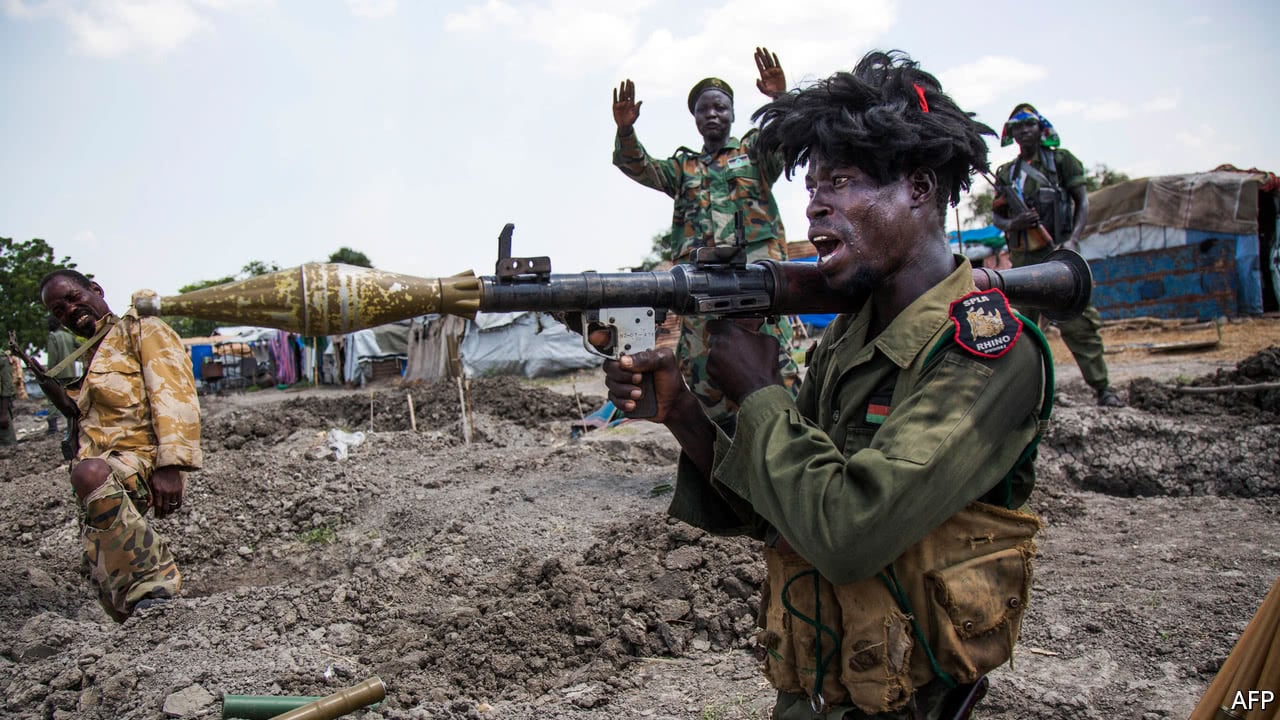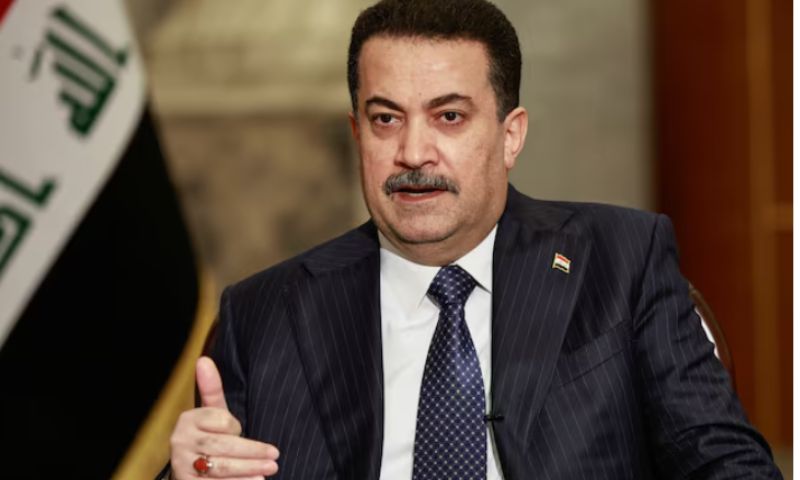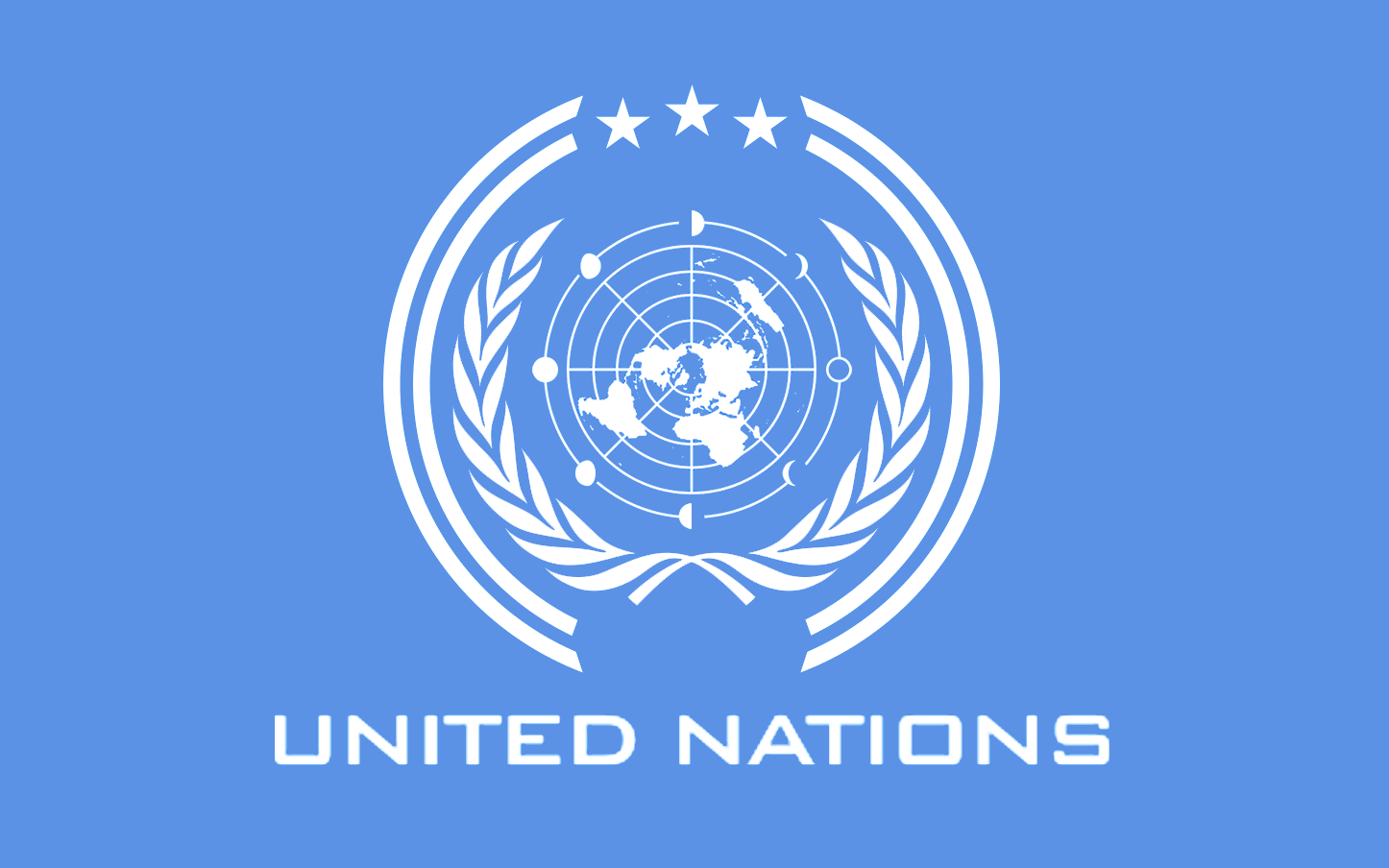Headlines
UN Committed to Peaceful Nigeria, Says Guterres
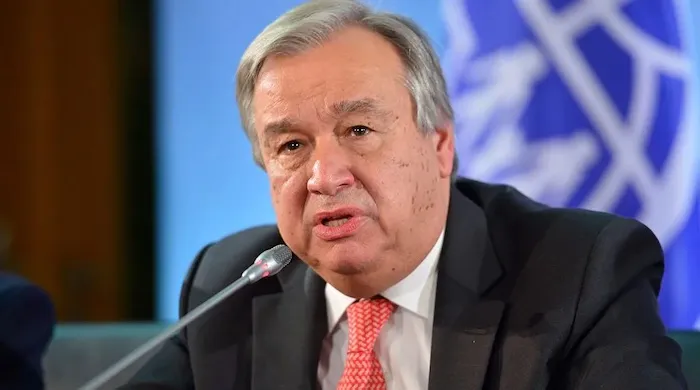
By Derrick Bangura
United Nations (UN) Secretary-General Antonio Guterres says the intergovernmental organisation remains steadfast in its commitment to a peaceful Nigeria. Guterres stated this on Wednesday in Abuja during a two-day visit to the country.
Guterres called for the prosecution of those that attacked the UN House in Abuja on August 26, 2011, stressing that perpetrators of terrorism in Nigeria must be held to account. He said the international body dedicated to maintaining global peace and security was adopting a victim-centred approach to the fight against terrorism in the country.
Guterres, who also paid a working visit to President Muhammadu Buhari, disclosed that the UN had concluded plans to offer Nigeria an additional $351 million as part of its $1.1 billion humanitarian response scheme for the country.
Buhari, in his remarks, expressed Nigeria’s gratitude to the UN and world leaders who were supporting the country in its fight against terrorism. He said the recent spotlight on Russia and Ukraine could easily distract attention from other pertinent global challenges.
The UN chief, who was on the last day of his two-day visit, laid a wreath in honour of victims of the August 26, 2011 terrorist attack on the UN House. The attack claimed the lives of 23 persons, including many UN staff and civilians.
“On that tragic day (August 26, 2011), an appalling terrorist attack on the UN House left 23 UN employees and civilians’ dead and 16 injured,” Guterres said. “Those staff members, who lost their lives, are heroes, who proudly served Nigerians through the UN organisations,” he added.
The secretary-general stated, “We encourage all Nigerians, who have endured similar violence in their own communities. In our victim-centred approach, perpetrators must be held accountable.”
Guterres thanked the Nigerian government for repairing the UN House, which had enabled the staff to return.
Speaking after meeting with the UN chief, Catholic Archbishop Emeritus of Abuja, Cardinal John Onaiyekan, told reporters that his interaction with Guterres was on how to resolve the dilemma of a country full of talented people, but facing a lot of challenges.
Onaiyekan said, “Nigerians are genuinely religious, but we see around us so much corruption and outright wickedness.” He stated that it had become pertinent to interrogate how a nation could be so rich, but full of poor people; and how a nation could be full of talented people and yet hardly organised.
The priest laid the problem at the door of the government.
Onaiyekan said he told the UN secretary-general that Nigerians “are not satisfied with how far the rulers are dealing with the issues concerning us, the issue of poverty, the issue of insecurity, and the issues of social services. The government tells us they are doing their best and we say that their best is not good enough. We believe we can do better.”
On the lingering herders-farmers’ crisis, the Cardinal regretted the failure of the federal government to address the issue of armed herdsmen in the last 10 years, saying this is perpetuating the displacement of farmers.
He said, “It seems the displacement is becoming permanent and the herders are taking over the farmlands and the government still claims they have no way of bringing things back to normalcy. The result is that farmers can no longer farm and we are facing the prospects of famine, because the parts of Nigeria that used to produce a lot of food, many of them can no longer farm.”
A Professor of Law at the University of Nigeria, Nsukka, Joy Ngozi Ezeilo, who also met the UN chief with her group, said, “We discussed the problems and the status of women in Nigeria and how he can help us to hold our elected officials to account, especially, when it comes to gender parity and women participation in politics.”
During his meeting with Buhari, Guterres said following his visit to Borno State on Tuesday, “I came out of Borno with the sense that Nigeria is able to defeat this threat.
“We are very active in support of the humanitarian efforts of the Nigerian government and that is why we have called for an additional $351 million as part of the overall $1.1 billion for humanitarian response plan for Nigeria.
“But despite all they have seen and endured, the people I met remain hopeful and committed to returning to their communities and resuming their lives.
“To that end, I welcome the establishment of the Presidential Committee on the Repatriation, Return and Resettlement of Displaced Persons in the North-east.
“This spirit of hope amidst hardship – and solidarity in struggle – was also at the centre of my discussions with the presidency today.”
The secretary-general said discussions with Buhari also touched on laying the groundwork for peaceful and democratic elections in the country next year, and the full participation of Nigerian women and young people.
While speaking with newsmen, Guterres stated that measures to address security challenges in the country, Lake Chad, and the Sahel, including the UN Integrated Strategy for the Sahel, were discussed during his meeting with Buhari.
According to him, “We also discussed the government’s measures to address security challenges across the country. I want to extend my deepest condolences to the victims of the appalling attacks in Plateau State two and a half weeks ago. It’s a tragic reminder of terrorism scourge across West Africa and the Sahel.
“Another reason why the United Nations is committed to supporting national and regional efforts to combat terrorism, violent extremism, organised crimes and the root causes, such as poverty, exclusion and food insecurity. This includes the UN’s integrated strategy for the Sahel.”
Guterres thanked Buhari for supporting the Multinational Joint Task Force and the Lake Chad Basin Commission, and promised more commitment from the UN on COVID-19 vaccination, vulnerability of countries to global warming, global food crisis response, and reform of the UN Security Council.
“I thanked President Buhari for his unwavering support of the Multinational Joint Task Force and the Lake Chad Basin Commission. And we also discussed the other challenges that, of course, Nigeria is facing today. Nigeria was, like all African countries, victim of the unequal recovery from COVID-19,” he added.
The UN secretary-general said the war in Ukraine would make things worse with regard to global food, energy and financial systems.
He said, “Our analysis indicates that the war in Ukraine is only making things worse, setting in motion a three-dimensional crisis that is devastating global food, energy and financial systems for the developing countries.
“That is why in the earliest days of this war, I established the Global Crisis Response Group on Food, Energy and Finance, involving all UN agencies and international financial institutions.
“The steering committee is chaired by the Deputy Secretary-General that you know very well, Amina Mohammed, and the group has developed concrete recommendations in three areas.
“One, we need to ensure a steady flow of food and energy through open markets by lifting all unnecessary export restrictions, directing surpluses and reserves to those in need, and keeping a lid on food prices to calm our market volatility.
“But let me be clear, there is really no true solution to the problem of global food security without bringing back the agricultural production of Ukraine and the food and fertiliser production of Russia and Belarus into world markets, despite the war. I’m determined to do everything to facilitate a dialogue that can help achieve this objective.
“Two, on energy, countries must resist hoarding, and release strategic stockpiles and additional reserves to countries in need, while accelerating the deployment of renewable energy.
“And, three, international financial institutions need to urgently increase liquidity and fiscal space and improve existing debt relief mechanisms, so governments can now not only avoid default, but they can invest in their people, especially in universal social protection at this moment of rising prices.
“The United Nations presented concrete proposals during the spring meetings of the World Bank and the IMF, ranging from the mobilisation of the various funds and instruments that already exist – but are not sufficiently implemented – to a much stronger use and redistribution of special drawing rights, as well as effective debt relief measures.”
Guterres, who was in Borno State on Tuesday, said what he saw was a departure from the picture of hopelessness and despair that had been painted, adding, “People exuded hope.”
He stated, “Yesterday (Tuesday), I visited Maiduguri, where the United Nations is supporting the internally displaced. I was deeply moved by their stories and struggles.
“These include the struggles with hunger, with the World Food Programme projecting 4.1 million people in the North-east of Nigeria to be food insecure in the upcoming lean season.
“Yesterday, I had the opportunity to visit Borno State and I must confess I arrived in Borno with the impression caused by so many years in which I was hearing stories about how dramatic the situation was, so terrible. The suffering of the people, how impossible to control the terrorist activities, a sense of despair.
“But the Borno I met yesterday was the Borno of hope and I saw an enlightened policy, aiming not only at defeating militarily the terrorists, but at addressing the root causes of terrorism.
“I saw the governor committed to re-establish the confidence between the people in the government, committed to provide the people in their different villages around the state the capacity to protect themselves.
“Committed to create conditions for the return of the displaced, but also for the reintegration of those that have abandoned Boko Haram, that have finally discovered that terrorism is a crime against humanity and the crime against God’s will and that now need support to reintegrate into society, and that support I could witness in the visit I made.
“That’s why yesterday I appealed strongly to the international community to fully support what is being done in Borno State, to make sure that the hope that I saw can be transformed into a reality of peace and prosperity for everybody.
“And I believe Nigeria and its people have a big role to play in shaping solutions to the global crisis engulfing our world.”
Earlier, Buhari noted that the country and the African continent were already concerned that the attention on Russia and Ukraine could crowd out other global issues. He added that the visit of the UN chief clearly showed that “the world has not forgotten us.”
According to Buhari, terrorism remains a threat to global peace, security and progress, with many killed, and millions displaced by the insurgents.
He added, “When we assumed office, the North-east was the major security problem we inherited in 2015, but we have been able to make people understand that you cannot kill people and shout ‘Allahu Akbar,’ (God is great!).
“It is either you don’t know what you are saying or you are simply stupid. God is a God of justice, so you cannot kill people and say God is great. Luckily, the people understood our message and it has made great impact.”
Buhari told his visitor that the government had started a gradual, but steady, process of resettlement and reintegration, where citizens were encouraged to return to their farms, businesses and other pursuits in life.
The president thanked the secretary general for the maiden visit to Nigeria.
Headlines
Noble Ladies Champion Women’s Financial Independence at Grand Inauguration in Abuja

Women from diverse backgrounds across Nigeria and beyond gathered at the Art and Culture Auditorium, Abuja, for the inauguration and convention of the Noble Ladies Association. The event, led by the association’s Founder and “visionary and polished Queen Mother,” Mrs. Margaret Chigozie Mkpuma, was a colourful display of feminine elegance, empowerment, and ambition.
The highly anticipated gathering, attended by over 700 members and counting, reflected the association’s mission to help women realise their potential while shifting mindsets away from dependency and over-glamorization of the ‘white collar job.’ According to the group, progress can be better achieved through innovation and creativity. “When a woman is able to earn and blossom on her own she has no reason to look at herself as a second fiddle,” the association stated.
One of the association’s standout initiatives is its women-only investment platform, which currently offers a minimum entry of ₦100,000 with a return of ₦130,000 over 30 days—an interest rate of 30 percent. Some members invest as much as ₦1 million, enjoying the same return rate. Mrs. Mkpuma explained that the scheme focuses on women because “women bear the greater brunt of poverty” and the platform seeks “to offer equity in the absence of economic equality.”
Education is also central to the Noble Ladies’ mission, regardless of age. Their mantra, “start again from where you stopped,” encourages women to return to school or upgrade their skills at any stage in life. The association believes that financial stability is vital in protecting women from cultural practices that dispossess widows of their late husbands’ assets, while also enabling them to raise morally and socially grounded families.
Founded on the vision of enhancing women’s skills and achieving financial stability, the association rests on a value system that discourages pity and promotes purpose. “You have a purpose and you build on that purpose to achieve great potentials and emancipation,” Mrs. Mkpuma said.
A criminologist by training and entrepreneur by practice, she cautions against idleness while waiting for formal employment. “There are billions in the informal and non-formal sectors waiting to be made,” she said, rejecting the “new normal of begging” and urging people to “be more introspective to find their purpose in life and hold on to it.”
Mrs. Mkpuma’s management style keeps members actively engaged, focusing on vocational skills and training to prepare them for competitive markets. She is exploring “innovative integration of uncommon technologies” and is already in talks with international franchises to invest in Nigeria, with Noble Ladies as first beneficiaries.
The association’s core values include mutual respect, innovation, forward-thinking, equal opportunity, and financial emancipation. With plans underway to establish a secretariat in the heart of Abuja, the group aims to expand its impact.
The event drew high-profile guests, including former Inspector General of Police, Mike Okiro, and a host of VIPs, marking a significant milestone in the association’s drive for women’s empowerment.
Headlines
NEPZA, FCT agree to create world-class FTZ environment

The Nigeria Export Processing Zones Authority (NEPZA) has stepped in to resolve the dispute between the Federal Capital Territory Administration and the Abuja Technology Village (ATV), a licensed Free Trade Zone, over the potential revocation of the zone’s land title.
Dr. Olufemi Ogunyemi, the Managing Director of NEPZA, urged ATV operators and investors to withdraw the lawsuit filed against the FCT administration immediately to facilitate a roundtable negotiation.
Dr. Ogunyemi delivered the charge during a courtesy visit to the Minister of the Federal Capital Territory, Barrister Nyesom Wike, on Thursday in Abuja.
You will recall that the ATV operators responded to the revocation notice issued by the FCT administration with a lawsuit.
Dr. Ogunyemi stated that the continued support for the growth of the Free Trade Zones Scheme would benefit the nation’s economy and the FCT’s development, emphasizing that the FCT administration recognized the scheme’s potential to accelerate industrialisation.
Dr. Ogunyemi, also the Chief Executive Officer of NEPZA, expressed his delight at the steps taken by the FCT minister to expand the economic frontier of the FCT through the proposed Abuja City Walk (ACW) project.
Dr. Ogunyemi further explained that the Authority was preparing to assess all the 63 licensed Free Trade Zones across the country with the view to vetting their functionality and contributions to the nation’s Foreign Direct Investment and export drives.
“I have come to discuss with His Excellency, the Minister of the Federal Capital Territory on the importance of supporting the ATV to succeed while also promoting the development of the Abuja City Walk project. We must work together to achieve this for the good of our nation,” he said.
On his part, the FCT Minister reiterated his unflinching determination to work towards President Bola Ahmed Tinubu’s Renewed Hope Agenda by bringing FDI to the FCT.
“We must fulfil Mr. President’s promises regarding industrialization, trade, and investment. In this context, the FCT will collaborate with NEPZA to review the future of ATV, a zone that was sponsored and supported by the FCT administration,” Wike said.
Barrister Wike also said that efforts were underway to fast-track the industrialisation process of the territory with the construction of the Abuja City Walk.
The minister further said the Abuja City Walk project was planned to cover over 200 hectares in the Abuja Technology Village corridor along Airport Road.
According to him, the business ecosystem aimed to create a lively, mixed-use urban center with residential, commercial, retail, hospitality, medical, and institutional facilities.
He added that the ACW would turn out to be a high-definition and world-class project that would give this administration’s Renewed Hope Agenda true meaning in the North-Central Region of the country.
Barrister Wike also indicated his continued pursuit of land and property owners who failed to fulfil their obligations to the FCT in his determination to develop the territory.
Headlines
Benue IDPs block highway, demand return to ancestral homes

Vehicular movement along the Yelwata axis of the Benue–Nasarawa highway was brought to a standstill on Wednesday as Internally Displaced Persons, IDPs, staged a protest, demanding immediate return to their ancestral homes.
The protesters, believed to be victims of persistent attacks by suspected herdsmen, blocked both lanes of the busy highway for several hours, chanting “We want to go back home”.
The protest caused disruption, leaving hundreds of motorists and passengers stranded.
Eyewitnesses said the displaced persons, many of whom have spent years in overcrowded IDP camps, are expressing deep frustration over the government’s delay in restoring security to their communities.
“We have suffered enough. We want to return to our homes and farms,” one of the protesters told reporters at the scene.
Security personnel were reportedly deployed to monitor the situation and prevent any escalation, though tensions remained high as of press time.
Efforts to reach the Benue State Emergency Management Agency, SEMA, and other relevant authorities for comment were unsuccessful.
-

 Headlines4 years ago
Headlines4 years agoFacebook, Instagram Temporarily Allow Posts on Ukraine War Calling for Violence Against Invading Russians or Putin’s Death
-

 Headlines4 years ago
Headlines4 years agoNigeria, Other West African Countries Facing Worst Food Crisis in 10 Years, Aid Groups Say
-

 Foreign4 years ago
Foreign4 years agoNew York Consulate installs machines for 10-year passport
-

 News1 year ago
News1 year agoZero Trust Architecture in a Remote World: Securing the New Normal
-

 Entertainment3 years ago
Entertainment3 years agoPhyna emerges winner of Big Brother Naija Season 7
-

 Headlines2 years ago
Headlines2 years agoNigeria Customs modernisation project to check extortion of traders
-

 Entertainment2 years ago
Entertainment2 years agoMovie download platform, Netnaija, announces closure
-

 Economy2 years ago
Economy2 years agoWe generated N30.2 bn revenue in three months – Kano NCS Comptroller




